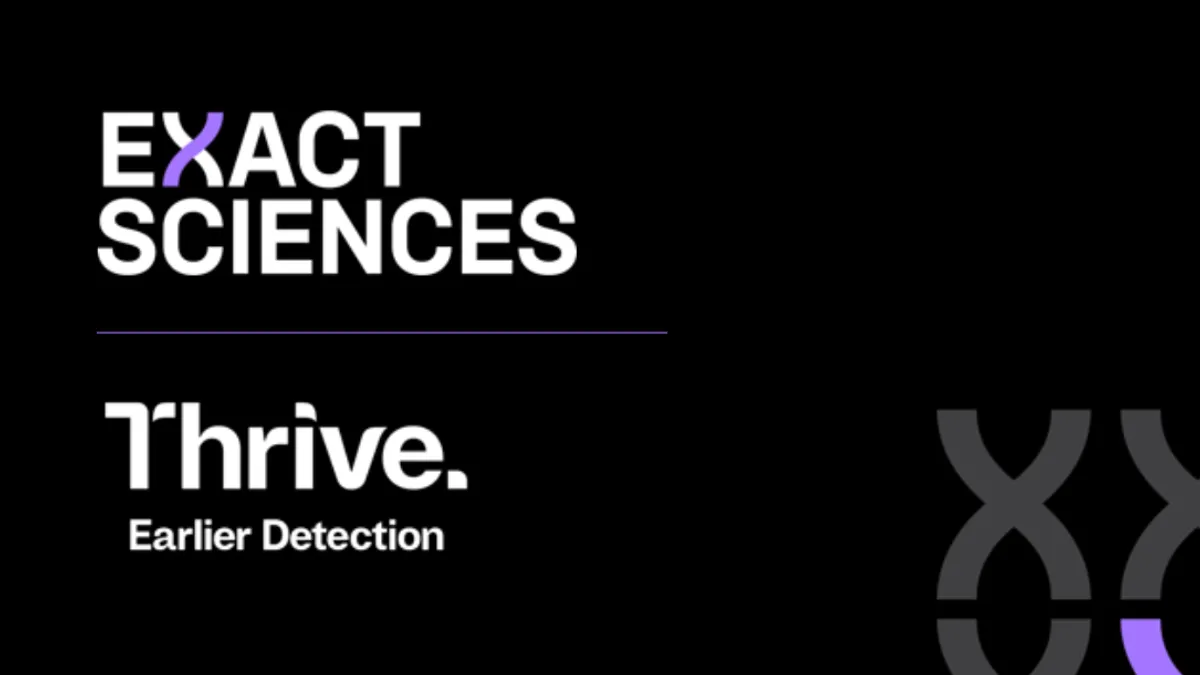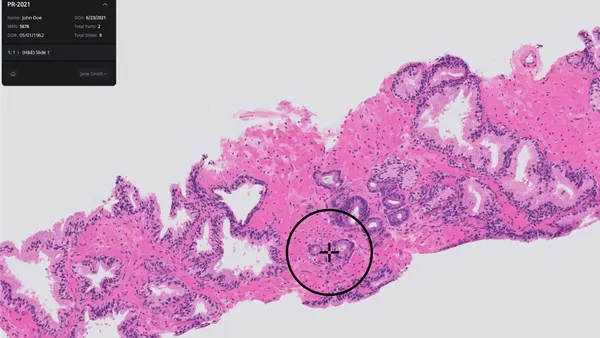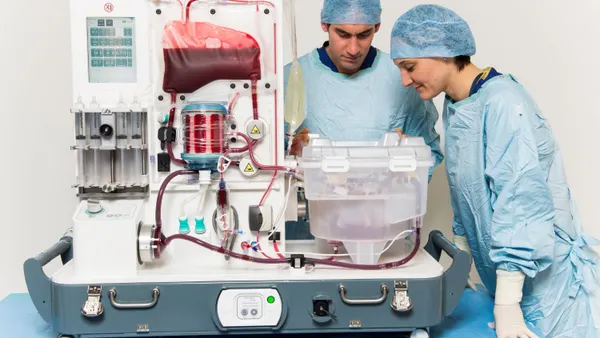Dive Brief:
-
Exact Sciences said Tuesday it plans to buy fellow liquid biopsy developer Thrive Earlier Detection in a cash-and-stock deal worth up to $2.15 billion, sending its stock up 19%. The deal is expected to close in the first quarter of 2021.
-
Thrive's main offering is a not-yet-marketed blood-based test that screens for 10 cancers. Called CancerSEEK, the test was developed by researchers at Johns Hopkins University and assessed in a 10,000-patient prospective study. Thrive formally launched last year, raising $100 million in Series A funding. The startup added another $257 million in a Series B round this year.
-
The acquisition comes five weeks after Illumina agreed to pay $8 billion to acquire Grail, which also develops blood tests to detect cancer. It's the second major acquisition for Exact Sciences since 2019; the diagnostics company bought cancer test maker Genomic Health for $2.8 billion last year.
Dive Insight:
Thrive has rapidly emerged as a major player in the development of liquid biopsy tests, a field that Exact Sciences is looking to expand into as it moves beyond its trademark Cologuard colorectal cancer test.
In 2018, researchers at Johns Hopkins University presented data on using CancerSEEK to detect changes in the levels of circulating proteins and mutations in cell-free DNA that are indicative of the presence of eight tumor types.
When applied to samples from cancer patients, CancerSEEK was able to successfully confirm the cancer between 69% and 98% of the time, depending on the tumor type. The test was also highly specific, correctly identifying healthy controls 99% of the time.
The data led in quick succession to the formation of Thrive, two mega-rounds, and now an acquisition by Exact Sciences. The cancer diagnostics company will pay $1.7 billion upon closing — 65% in stock, 35% in cash — with the potential for another $450 million in milestone payments.
Thrive attracted the buyout bid after validating its liquid biopsy in a prospective study that enrolled 10,000 women with no prior history of cancer in April.
Ninety-six participants developed cancers during the study. The liquid biopsy detected 26 of the cancers before other methods. Conventional screening such as mammograms picked up 24 of the cases, with the rest identified by symptoms or by other means. The results suggest the test may double the number of cancers identified through screening.
Notably, in two thirds of those participants, the liquid biopsy seemed to catch cancers early, before their disease had spread and metastasized.
The cases were caught by an early version of CancerSEEK that analyzed 16 genes and nine proteins linked to multiple cancers. CancerSEEK detected cancers affecting 10 organs in the study. There are no standard-of-care screening tests for seven of those organs.
Exact Sciences has advanced its own multi-cancer liquid biopsy, leading to data last month that wowed investors and sent its share price up 27%. The results suggested Exact Sciences has a shot at maintaining market share in colorectal cancer screening despite competition from single and multi-cancer liquid biopsy rivals such as Freenome, Grail, Guardant Health and Natera. The test could also position Exact Sciences to screen for other cancers.
While Exact Sciences and Thrive are both working on tests that screen for cancers in blood samples, the diagnostics work in different ways, are at different points in development and may each perform better in different screening scenarios.
Exact Sciences’ test looks for five epigenetic markers and three proteins. The company has not yet proven it can reliably detect cancers early. Two-thirds of the samples tested in last month’s data came from patients with Stage III and IV cancers — advanced, hard-to-treat forms of the diseases — although epigenetic markers could in theory enable earlier diagnoses.
Thrive’s test, in contrast, works by looking for proteins and mutations in DNA circulating outside of cells in the blood and has been shown to detect cancer early outside of clinical testing.
The nature of the test has led Thrive to build a R&D team specialized in next-generation sequencing and bioinformatics, areas that are potentially complementary to Exact Sciences’ capabilities. Thrive’s R&D team could benefit from access to Exact Sciences’ biomarkers, samples and deeper pockets.
In the nearer term, Exact Sciences’ effort to generate a return on its investment will rest on Thrive’s current test.
During a call with investors Tuesday, Exact Sciences CEO Kevin Conroy did not specify a timeline to market for a Thrive product.
Conroy argued the company’s growing position in liquid biopsy will not cannibalize its trademark Cologuard product.
A multicancer screening test won’t replace a mammogram in detecting breast cancer, or a colonoscopy or Cologuard test in screening for colorectal cancer, Conroy said, largely because the sensitivity of a multicancer test won’t match that of more traditional methods. Plus, pan-cancer tests screen for several forms of the disease that aren’t necessarily screened for today.
Other companies are targeting the same opportunity. Grail is aiming to get its multi-cancer screening test to market next year, and will now have Illumina’s support. Freenome and Natera are in the race, too.
When Illumina made its move for Grail, Cowen analysts predicted “a new era of consolidation in the space.”. One month later, Exact Sciences has delivered on those expectations, handing a payday to Thrive investors such as Casdin Capital, Section 32 and Third Rock Ventures.
Conroy wouldn’t confirm whether Exact Sciences would launch CancerSeek as a lab-developed test — an approach that Grail has said it will take — rather than waiting for a full FDA review.
In addition to buying Thrive, Exact Sciences will pay $410 million to buy Base Genomics.
With Base Genomics, Exact Sciences gains control of technology that helps analyze DNA methylation and mutations in a single sample.
Exact Sciences also filed to raise $869 million, which it said it may put toward the acquisition of Thrive. Earnings numbers disclosed separately on Tuesday showed an an 87% jump in revenue compared to the same period last year.
This story has been updated with insight.













